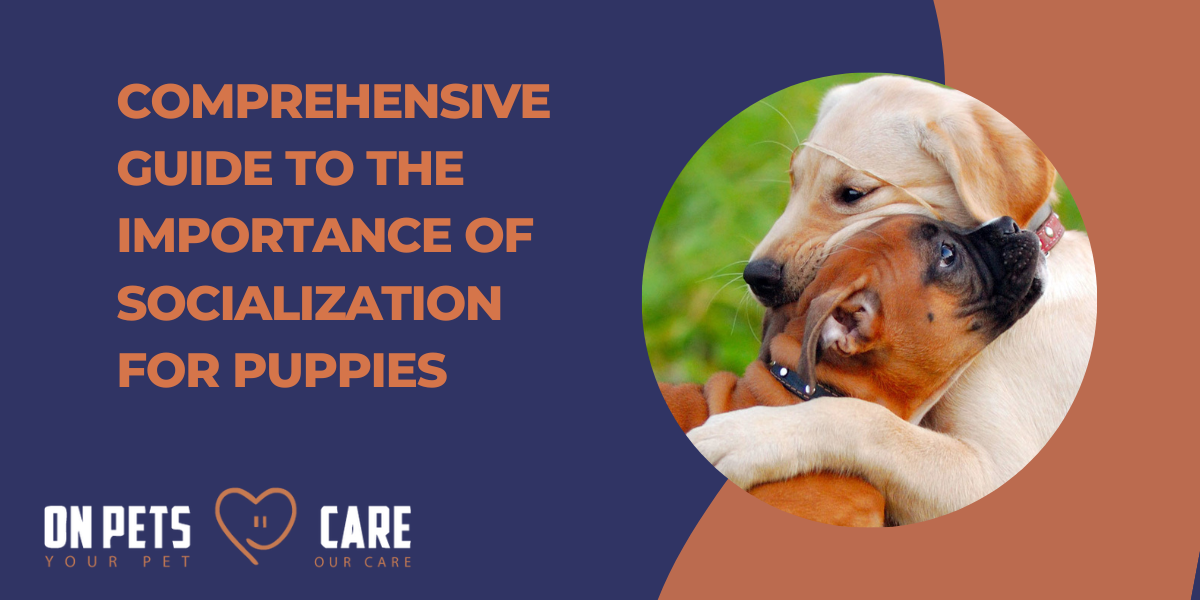Comprehensive Guide to The Importance of Socialization for Puppies
Pets are like sponges, ready to absorb the world around them. Just like children, these adorable furballs need to learn and grow through experiences, and one of the most crucial aspects of their development is puppy socialization. In this comprehensive guide, we’ll delve into the importance of socialization for puppies, understand how to socialize a puppy with humans and explore effective ways to ensure your furry friend becomes a well-adjusted, happy, and confident adult dog.
Whether you’re a new pup parent or just want to learn more about nurturing your canine companion, this guide has you covered.
Introduction
Picture this: a small, fluffy ball of energy exploring the world with boundless curiosity and a wagging tail. That’s your puppy! Puppy socialization is the key to unlocking their full potential and ensuring they grow up to be well-mannered, confident, and happy dogs.
What is Puppy Socialization?
The process of introducing your young puppy to diverse people, animals, locations, and experiences in a pleasant and regulated way is known as puppy socialization. This process helps them become comfortable and adaptable in different situations, preventing fear and anxiety in their adult life.
The Importance of Socialization for Puppies?
Building Confidence
Puppies need to understand that the world is a safe and joyful place just like humans do. Early positive experiences build their confidence, making them less likely to develop behavioral problems stemming from fear.
Preventing Behavioral Issues
Unsocialized puppies are more likely to develop aggression, anxiety, and fear-related issues as adults. Socialization helps them learn appropriate ways to interact and cope with new experiences. When to Start Socializing Your Puppy
Puppy socialization is best between the ages of three and fourteen weeks. They are most open to new experiences at this time. To protect their safety, though, be cautious of their immunization regimen and speak with your veterinarian. Getting Your Puppy Socialized with People, Family, and Friends. Encourage interactions with various family members and close friends.
Your dog will learn to distinguish between familiar faces and strangers thanks to these good interactions. Meeting New People
Introduce new individuals to your puppy gradually. Create good connections by rewarding yourself and others. Allow your dog to approach people at their speed while asking strangers to kneel. The Function of Dog Peers in Socialization
Play sessions with other puppies and contact with polite adult dogs are beneficial.
They acquire crucial canine communication abilities, such as the ability to read body language and comprehend limits.
Exploring Different Environments
Outdoor Adventures
Take your puppy on walks in different settings—parks, beaches, and nature trails. Expose them to various sounds, smells, and sights to broaden their comfort zone. Exposure to Urban Settings
City life comes with unique stimuli traffic, crowds, and urban noises. Gradually introduce your pup to these elements so they grow up at ease in diverse environments.
Positive Reinforcement in Socialization
Reward your puppy with treats, praise, and affection whenever they encounter new experiences calmly. This positive reinforcement strengthens their association between novelty and positivity. Common Challenges in Puppy Socialization.
Fear and Anxiety
Some puppies might show signs of fear during socialization. Go at their pace, offering reassurance, and avoid overwhelming situations. Consult a professional if fear persists.
Overcoming Traumatic Experiences
If your puppy faces a negative experience, work gently to rebuild their confidence. Slowly reintroduce the trigger in a controlled manner, ensuring positive associations. Professional Help and Training
Working with a Trainer
Hire a skilled dog trainer who has expertise in socialization. They can help you by exposing you gradually and by teaching you how to handle particular difficulties.
Puppy Socialization Classes
Enroll your pup in a well-structured socialization class. These classes provide controlled interactions with other puppies and supervised exposure to new environments.
Socialization vs. Isolation: A Closer Look
Socialization lays the foundation for a well-balanced dog, while isolation can lead to behavioral problems. A properly socialized pup is likelier to be friendly, adaptable, and less stressed. The Lifelong Benefits of Early Socialization
Better Adaptation to Change
Puppies exposed to diverse experiences during their formative weeks are more adaptable to changes in their environment, reducing stress in unfamiliar situations.
Reduced Aggression
Proper socialization minimizes the development of aggressive tendencies. Dogs that are confident in various interactions are less likely to react defensively out of fear.
Onpets Care
As you embark on this socialization journey, remember that your pup’s well-being is at the forefront. Prioritize their comfort, monitor their reactions, and seek professional guidance when needed.
Conclusion
In the grand tapestry of a dog’s life, the socialization phase is the thread that weaves confidence, resilience, and happiness. By introducing your puppy to the world in a positive, controlled manner, you’re setting them up for a lifetime of joyous exploration and harmonious interactions. So, let your pup’s journey into the world be guided by patience, positivity, and the promise of a wagging tail.
FAQs (Frequently Asked Questions)
Q1: Can I socialize my puppy after 14 weeks of age?
A: While the prime window for socialization is up to 14 weeks, you can still socialize older puppies with gradual introductions and positive experiences.
Q2: Is it safe to take my unvaccinated puppy outside for socialization?
A: Consult your vet to create a safe socialization plan considering your pup’s vaccination schedule and potential risks.
Q3: My puppy seems fearful during socialization. What should I do?
A: Take it slow, don’t force interactions, and use positive reinforcement. If fear persists, seek guidance from a professional trainer.
Q4: Can socialization prevent separation anxiety?
A: Proper socialization can contribute to a well-adjusted dog, potentially reducing separation anxiety, but it might not eliminate it.
Q5: What if my puppy doesn’t enjoy socialization classes?
A: Not all puppies are the same. If classes aren’t a good fit, focus on controlled exposure to positive experiences outside of class settings.



